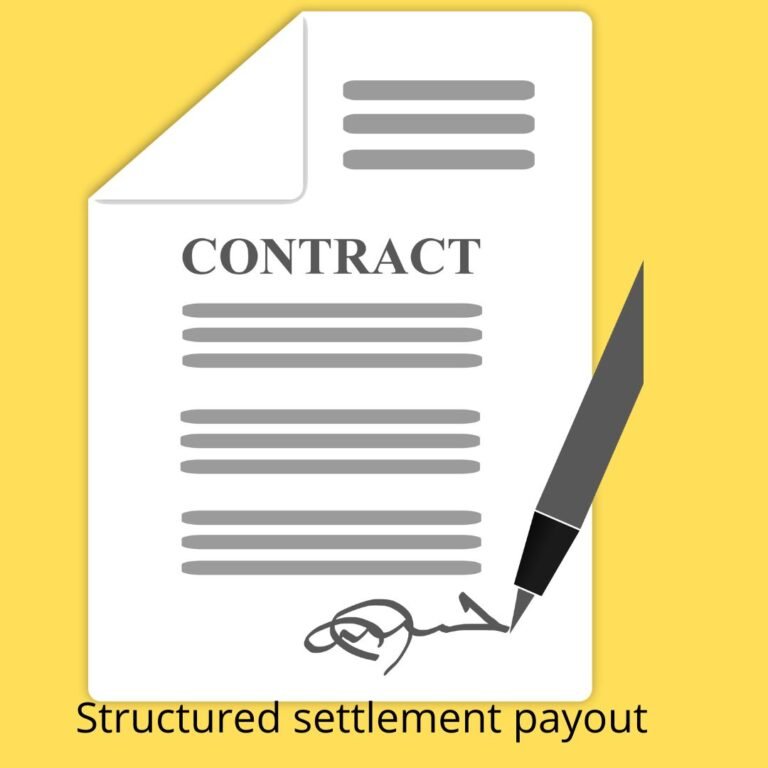Structured settlement cash out, a term that may ring bells for those navigating the financial labyrinth, is a process that can offer both opportunities and challenges. These financial arrangements are typically designed to provide long-term benefits to recipients, often following personal injury claims or other legal settlements. However, as life unfolds, circumstances may change, prompting individuals to consider cashing out their structured settlements for immediate financial relief.
In essence, structured settlements are periodic payments made as a result of a legal settlement, aiming to ensure a steady income over time. The mechanics of these arrangements involve a third-party entity, which purchases the rights to the settlement payments, thereby enabling recipients to access a lump sum. Scenarios where structured settlements are prevalent include personal injury cases, workers’ compensation claims, and wrongful death suits—each tailored to support individuals in managing their financial futures.
Understanding Structured Settlements

Structured settlements are financial arrangements designed to provide compensation to individuals who have sustained injuries or losses, typically stemming from personal injury claims or other legal settlements. The primary purpose of structured settlements is to ensure that the claimant receives a steady stream of income over a predetermined period, rather than a lump sum payment. This approach is intended to provide long-term financial stability and support, particularly in cases where the claimant may have ongoing medical expenses or diminished earning capacity.
In essence, a structured settlement works by converting a lump sum settlement into a series of periodic payments. These payments are often funded through an annuity purchased from a life insurance company, which guarantees the payment amounts and schedule. The claimant, or the injured party, agrees to this arrangement as part of their settlement, allowing them to receive payments over time, often tailored to their specific needs. Structured settlements can be designed to commence immediately or be deferred to a later date, depending on the circumstances of the case.
Common Scenarios for Structured Settlements
Structured settlements are typically utilised in various scenarios, particularly in personal injury cases, which may include the following circumstances:
- Motor Vehicle Accidents: Claimants who have sustained significant injuries in car accidents often opt for structured settlements to cover long-term medical treatment and rehabilitation costs.
- Workplace Injuries: Employees who suffer debilitating injuries on the job may receive structured settlements to help maintain their financial wellbeing as they navigate recovery and potential career changes.
- Medical Malpractice Cases: Victims of medical negligence frequently benefit from structured settlements that provide financial support for ongoing medical care and related expenses.
- Product Liability Claims: Individuals harmed by defective products may choose structured settlements to ensure they have a reliable income stream to manage recovery and any future costs associated with their injuries.
- Wrongful Death Claims: In the unfortunate event of a wrongful death, structured settlements can provide support to surviving family members, helping them cope with the financial impact of the loss.
In each of these scenarios, the structured settlement serves as a crucial financial tool, allowing claimants to receive compensation in a manner that aligns with their present and future needs, thereby mitigating the risk of mismanagement associated with a lump sum payment.
The Process of Cashing Out Structured Settlements: Structured Settlement Cash Out

Cashing out a structured settlement is a significant financial decision that can provide immediate access to funds. This process involves several steps, methods, and factors that must be considered to ensure a well-informed decision.
There are various approaches to cashing out a structured settlement, typically revolving around selling future payments for a lump sum. Understanding the detailed steps and available methods is crucial for individuals considering this option.
Steps Involved in Cashing Out
The process of cashing out a structured settlement can be delineated into specific steps, each requiring careful consideration. Below are the primary stages involved:
- Assessment of the Structured Settlement: Begin by reviewing the terms of your settlement. Assess the total future payments, their schedule, and the current value of those payments.
- Research Buyers: Look for reputable companies that purchase structured settlements. Evaluate their offers, reputation, and the terms they provide.
- Request Quotes: Contact multiple buyers to obtain quotes for your settlement. This helps in understanding the market value of your structured settlement.
- Review Terms and Conditions: Examine the terms offered by each buyer, including fees, discounts, and any future payment implications.
- Consult a Financial Advisor: Seek professional advice to understand the financial implications of cashing out, including tax considerations and the effect on your long-term financial health.
- Legal Approval: Many cash-out transactions require court approval. Prepare necessary documentation and submit it for review.
- Finalize the Sale: Once approved, sign the necessary documents to complete the sale and receive your lump sum payment.
Methods of Cashing Out Structured Settlements
There are several methods available for cashing out structured settlements, each with unique implications for the seller. It is vital to weigh these options carefully:
- Direct Sale: This involves selling the rights to future payments to a third party in exchange for a lump sum, often negotiated based on the present value of the payments.
- Partial Sale: In this method, only a portion of the settlement payments is sold, allowing the seller to maintain some future income while obtaining immediate funds.
- Loan Against Settlement: Instead of selling future payments, one can secure a loan using the structured settlement as collateral. This often comes with interest charges and must be repaid.
Key Factors Influencing the Decision to Cash Out, Structured settlement cash out
Several important factors can influence the decision to cash out a structured settlement. Understanding these can help individuals make a more informed choice:
- Immediate Financial Needs: A pressing need for cash, such as medical expenses or debt repayment, may prompt the decision to cash out.
- Future Payment Value: The perceived value of future payments compared to the lump sum offer can impact the decision-making process.
- Market Conditions: Fluctuations in interest rates and economic factors can influence the offers received from buyers.
- Tax Implications: Understanding the tax treatment of lump sum payments versus future payments is essential in assessing long-term financial impact.
- Personal Financial Goals: Individual financial goals, including retirement planning or investment strategies, may dictate whether cashing out is beneficial.
“The decision to cash out a structured settlement should not be taken lightly. It’s crucial to consider both the immediate benefits and the long-term consequences of such a decision.”
Advantages and Disadvantages of Cashing Out

Cashing out a structured settlement is a significant financial decision that entails weighing both the benefits and drawbacks. For individuals seeking immediate liquidity, the appeal of accessing a lump sum can be compelling, but it is essential to consider the long-term implications of such a choice. In this section, we will delve into the comparative advantages and disadvantages associated with cashing out structured settlements versus retaining them.
Benefits of Cashing Out a Structured Settlement
Cashing out a structured settlement can present several advantages, particularly for those who require immediate funds for pressing financial obligations.
- Immediate Access to Funds: By opting to cash out, individuals can obtain a considerable sum quickly, which can assist in addressing urgent expenses such as medical bills, home repairs, or debt repayments.
- Financial Flexibility: A lump sum provides the flexibility to invest in opportunities that may yield higher returns than the annuity payments, potentially enhancing long-term financial stability.
- Debt Reduction: Cashing out can enable individuals to eliminate high-interest debts, thereby improving their overall financial situation and credit score.
Drawbacks of Cashing Out a Structured Settlement
While there are clear benefits, cashing out structured settlements also carries notable risks and disadvantages that should be carefully considered.
- Loss of Long-Term Security: Structured settlements provide a steady stream of income, which may offer better financial security over time. Cashing out eliminates this regularity.
- Higher Costs: The process of selling a structured settlement can come with significant fees and costs, reducing the total amount received.
- Potential Tax Implications: Depending on the nature of the settlement, cashing out may trigger tax obligations that could diminish the overall financial benefit derived from the sale.
Financial Implications of Choosing to Cash Out
The decision to cash out a structured settlement can have profound financial implications that extend beyond immediate monetary gain.
“Cashing out can be a double-edged sword; it provides immediate relief but may compromise future financial wellbeing.”
Individuals must consider their current financial situation and future needs. If the lump sum is not managed prudently, it can be quickly depleted, leading to a precarious financial position.
Additionally, individuals should analyse their spending habits and consider how the cash will be utilised. For example, investing in a business venture might yield positive returns, but impulsive expenditures could result in financial instability. Therefore, it is paramount to approach this decision with a comprehensive understanding of both immediate and long-term financial health.
Legal and Financial Considerations
The cashing out of structured settlements necessitates careful consideration of both legal and financial dimensions. As this process can significantly impact one’s financial future, understanding the associated legal requirements, the selection of a competent financial advisor, and the tax implications is paramount.
Legal Requirements for Cashing Out Structured Settlements
The legal framework surrounding structured settlements is governed by specific requirements that must be adhered to when cashing out. Generally, a court approval is necessary to proceed with the transaction. This is primarily to ensure that the individual receiving the settlement is fully aware of the repercussions of liquidating their future payments.
A thorough review of the original settlement agreement and applicable state laws is critical. Each state has varying laws regarding the assignment of structured settlement payments. One must also consider potential waiting periods and the necessity for documentation that Artikels the reasons for seeking a cash-out.
Furthermore, it is advisable to engage legal counsel experienced in structured settlements to navigate through the complexities of the process.
Choosing the Right Financial Advisor
Selecting an appropriate financial advisor is crucial when considering the cash-out of structured settlements. The right advisor should possess a robust background in structured settlements and a thorough understanding of the financial implications involved.
When evaluating potential advisors, consider the following factors:
- Experience in Structured Settlements: Look for advisors with a proven track record in structured settlements specifically.
- Fee Structure: Understanding how the advisor charges for services—whether via commission, flat fee, or hourly rate—can impact your overall financial outcome.
- Client Testimonials: Seeking reviews or testimonials from previous clients can provide insight into the advisor’s effectiveness and reliability.
- Credentials: Verify that the advisor holds relevant certifications, such as CFP (Certified Financial Planner) or similar qualifications.
This careful selection process ensures that you are equipped with the necessary expertise to make informed decisions regarding your structured settlement cash-out.
Tax Implications of Cashing Out
Cash-out transactions can also trigger significant tax implications that must be carefully considered. Generally, structured settlement payments are tax-free under the Internal Revenue Code, which allows for tax-exempt income for the injury or claim involved. However, when one opts to cash out, the scenario changes.
The proceeds from the cash-out can be subject to taxation, depending on how the cash is derived. It is important to distinguish between the original settlement amount and any potential interest or investment gains accrued:
“As a general rule, only the interest earned on the settlement is taxable, while the principal amount remains non-taxable.”
Additionally, the timing of the cash-out can further impact tax liability. For instance, executing a cash-out in a year where other substantial income is present may lead to higher tax brackets. Therefore, consulting with a tax professional before proceeding is advisable to understand fully how a cash-out could affect your financial situation.
When contemplating financial arrangements, a structured settlement quote can provide clarity and insight. It’s crucial to understand your options thoroughly. Moreover, should you find the need for immediate cash, you might consider the option to sell structured settlement payments , thus gaining access to funds without lengthy delays.
Acquiring a structured settlement quote can significantly aid in understanding the worth of your agreement. If circumstances change or immediate cash is required, you may look into ways to sell structured settlement payments , ensuring you get the financial flexibility you need.